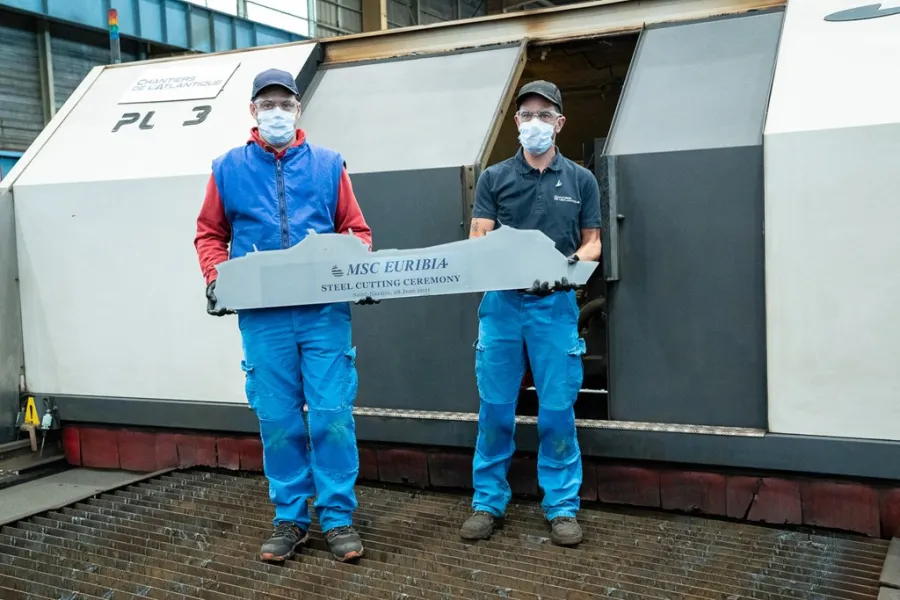
Today MSC Cruises announced the construction of its 22nd ship in the fleet at the steel cutting ceremony at Saint Nazaire shipyard in France. The latest ship will be named MSC Euribia after the ancient Greek goddess of the sea, entering in service in June 2023. The latest ship will be the most environmentally advanced vessel of MSC Cruises, as well as the second in the fleet to be powered by liquefied natural gas (LNG), the cleanest fossil fuel in the world.
Today's ceremony was attended by the Executive Chairman of MSC Cruises, Pierfrancesco Vago, together with the general manager of Chantiers de l'Atlantique, Laurent Castaing.
“Just as the ancient goddess harnessed the winds, weather and constellations to master the seas, our vision is for the MSC Euribia to master the deployment of sustainable technologies to protect and preserve our precious marine ecosystem. This ship marks a new milestone in our journey towards net-zero impact operations and is a testament to our commitment to foster and develop next-generation environmental technologies," Pierfrancesco Vago said.
LNG is by far the cleanest fuel currently available on a large scale and is capable of almost completely eliminating local pollutant emissions such as sulfur oxides (99%), nitrogen oxides (85%) and particles.
In terms of emissions with a global impact, LNG plays a key role in mitigating climate change and MSC Euribia's engines have the potential to reduce CO2 emissions by up to 25% compared to those powered by standard fuels. Furthermore, with the future availability of bio and synthetic forms of LNG, this energy source will allow a path towards further possible decarbonisation operations.
Environmental technologies on MSC Euribia:
Engines and fuels:
• 4 Wärtsilä dual fuel engines (12V and 16V) running on liquefied natural gas (LNG), occasionally on 0.1% sulfur marine diesel (MGO) so the ship does not require cleaning systems.
Emissions to air:
• Selective catalytic reduction system that reduces NOx emissions by up to 90% when the ship is running on MGO (LNG offers similar NOx reduction) - MSC Euribia will meet IMO Tier III standards regardless of fuel it uses
• Shore-to-ship electrical connectivity, which allows the ship to shut off its engines and connect to local power grids in ports where this infrastructure is available
Water treatment:
• Advanced wastewater treatment system complies with MEPC 227 (64) resolution of the International Maritime Organization to the most stringent standards in the world, the so-called "Baltic Standard"
• Advanced ballast water treatment system that will prevent the introduction of invasive species into the marine environment through discharges, in compliance with the Convention on Ballast Water Management of the International Maritime Organization
Protect Marine Life:
• Radiated Underwater Noise Management System, with hull and engine room design that minimize noise impact and consequently potential effects on marine fauna, particularly marine mammals in surrounding waters.
Energy efficiency :
• All of MSC Cruises' new creations incorporate a wide range of energy efficient equipment that helps reduce and optimize engine use. These include intelligent ventilation and advanced air conditioning systems with automated energy recovery cycles that redistribute hot and cold air to reduce demand. The ships use LED lighting controlled by intelligent management systems to further improve the energy saving profile. In collaboration with the shipyard, MSC Euribia will be equipped with automatic data collection systems for remote energy monitoring and advanced analysis, enabling real-time ground support to optimize operational efficiency on board.












